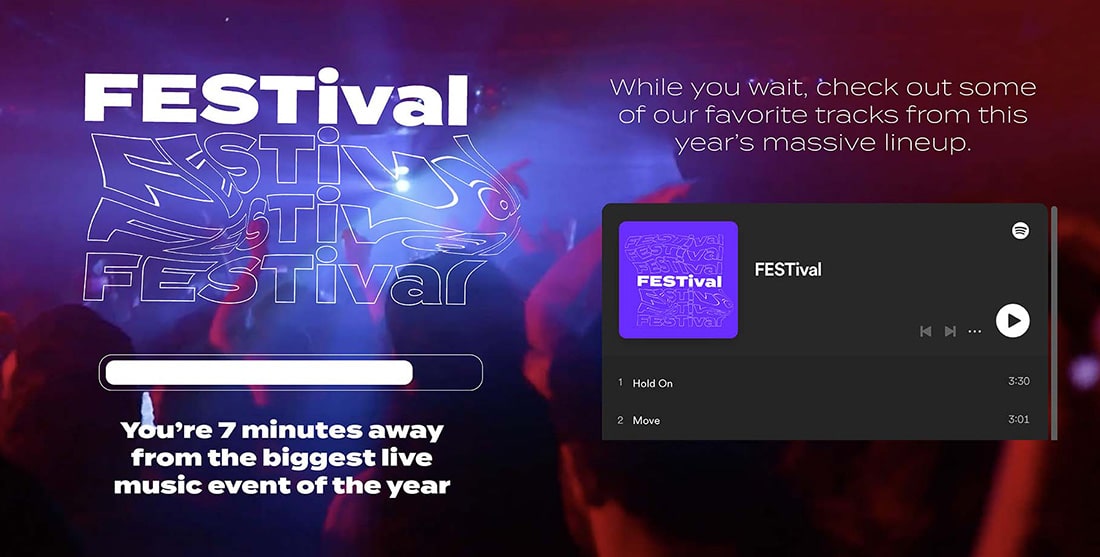What is a ticket queue? How do online ticket queues work? And why so many companies have online queues for tickets? Find out in this comprehensive guide to online ticket queues.
Table of contents
- What is an online ticket queue?
- How do ticket queues work?
- Are queues for tickets random or first-come-first-served?
- Which companies & organizations use online ticket queues?
- Why do companies use online ticket queues?
An online ticket queue is a cloud-based tool used by businesses and organizations to control the flow of traffic to their websites or apps. It prevents websites from crashing, blocks scalping and ticketing bots, and ensures fair and orderly access for fans during online ticket sales.
If you want tickets to a popular event, you’ll probably have to wait for them in an online ticket queue that looks something like the one below.
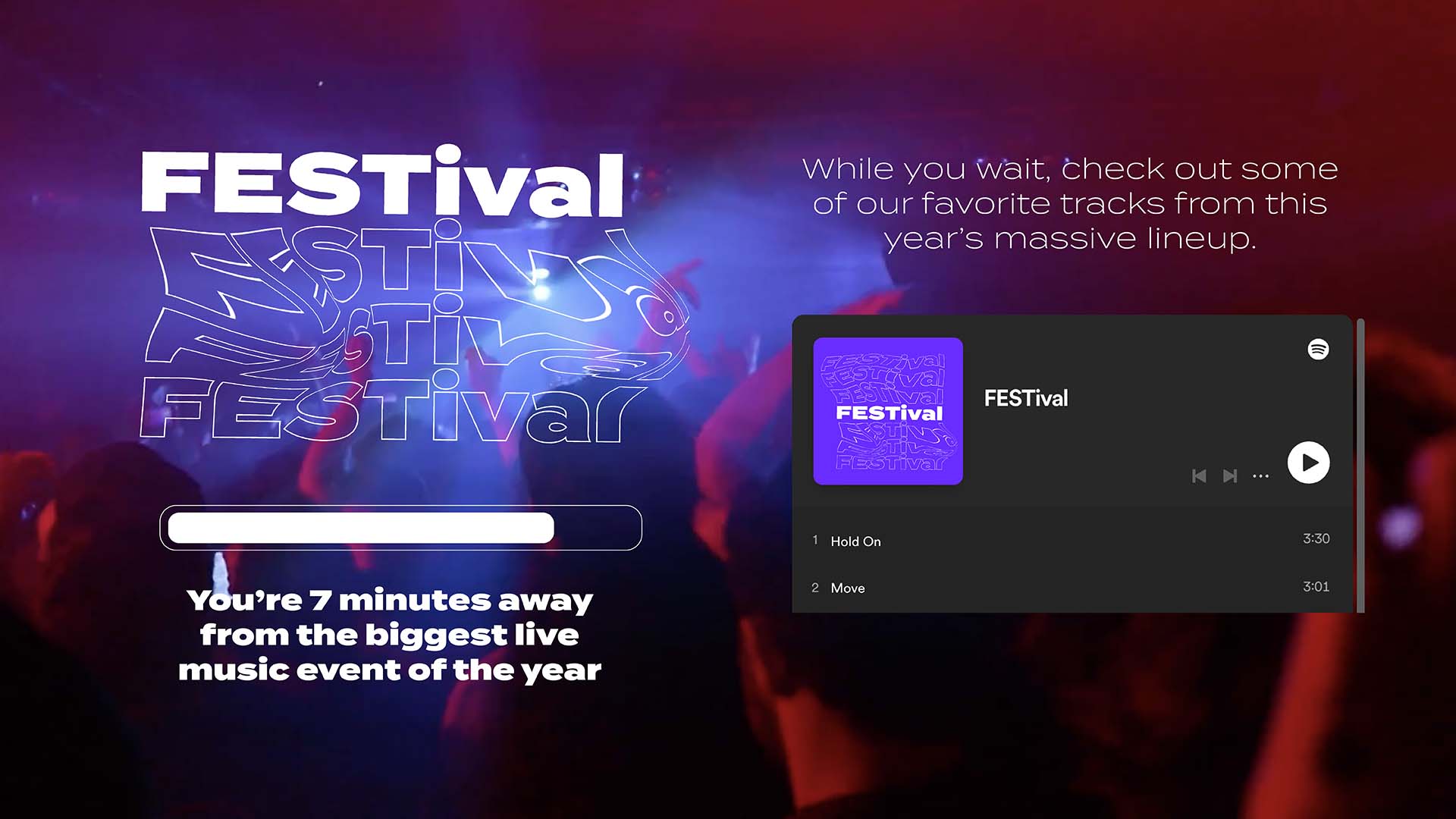
On this page, you should see detailed wait information like your position in line, your estimated wait time, and your progress. Ticketing companies using Queue-it may also include dynamic features such as embedded playlists, an email notification feature (allowing you to get an email when it’s your turn), and real-time updates on inventory availability.
When it’s your turn, you’ll get automatically flowed from the queue to the webpage or app you were trying to access, where you can purchase your tickets.
Online ticket queues help ticketing companies run high-profile sales that ensure every fan gets a fair, transparent, and reliable site experience. They:
- Ensure website performance: Ticketing queues absorb surges in traffic and control the flow of customers into the website, ensuring companies never exceed the technical capacity of their systems and can sell as fast as possible without crashing or overselling.
- Improve customer experience: Online ticket queues replace the frustrating experience of a website crash or slowdown with transparent and controlled access, including detailed info on spot in line and estimated wait time on a branded page that can feature interactive elements like videos or games.
- Deliver fair access: Online ticket queues like Queue-it come with sophisticated fairness mechanisms such as first-come-first-served access or live raffle randomization, ensuring all fans get a fair shot at getting tickets.
- Block bots & bad actors: Online ticket queues keep bots off websites like a security checkpoint at an airport keeps bad actors off flights. It sits between a webpage and the purchase path. As visitors flow through it in a controlled, orderly manner, companies can run identification checks with Queue-it’s suite of bot mitigation tools to determine whether they’ll be allowed to access the site.
RELATED: Behind-the-scenes of a Ticket Onsale: How Queue-it Blocked 8.3 Million Ticket Bots
Online ticket queues work by automatically redirecting visitors to a waiting room when they perform an action a website owner needs to manage—such as visiting a sale page or checking out—or when online traffic spikes to levels that could negatively impact the website’s performance.
When a customer tries to visit a ticket sale webpage, they get seamlessly flowed to a branded waiting room with detailed wait information.
They’ll experience a short wait in the queue for tickets, then, when it’s their turn, the queue will automatically flow them to the target page with a unique Queue token that allows them to browse the website and complete their purchase without restriction.
Ticket queues are often customized in style and URL to look like the websites they’re protecting. But in reality, when visitors are in the queue, they’re hosted on the online queue provider’s infrastructure. By temporarily hosting visitors the target website cannot handle, the ticket queue system reduces the strain on the website’s infrastructure, ensuring they don’t crash or face issues caused by surges in traffic.
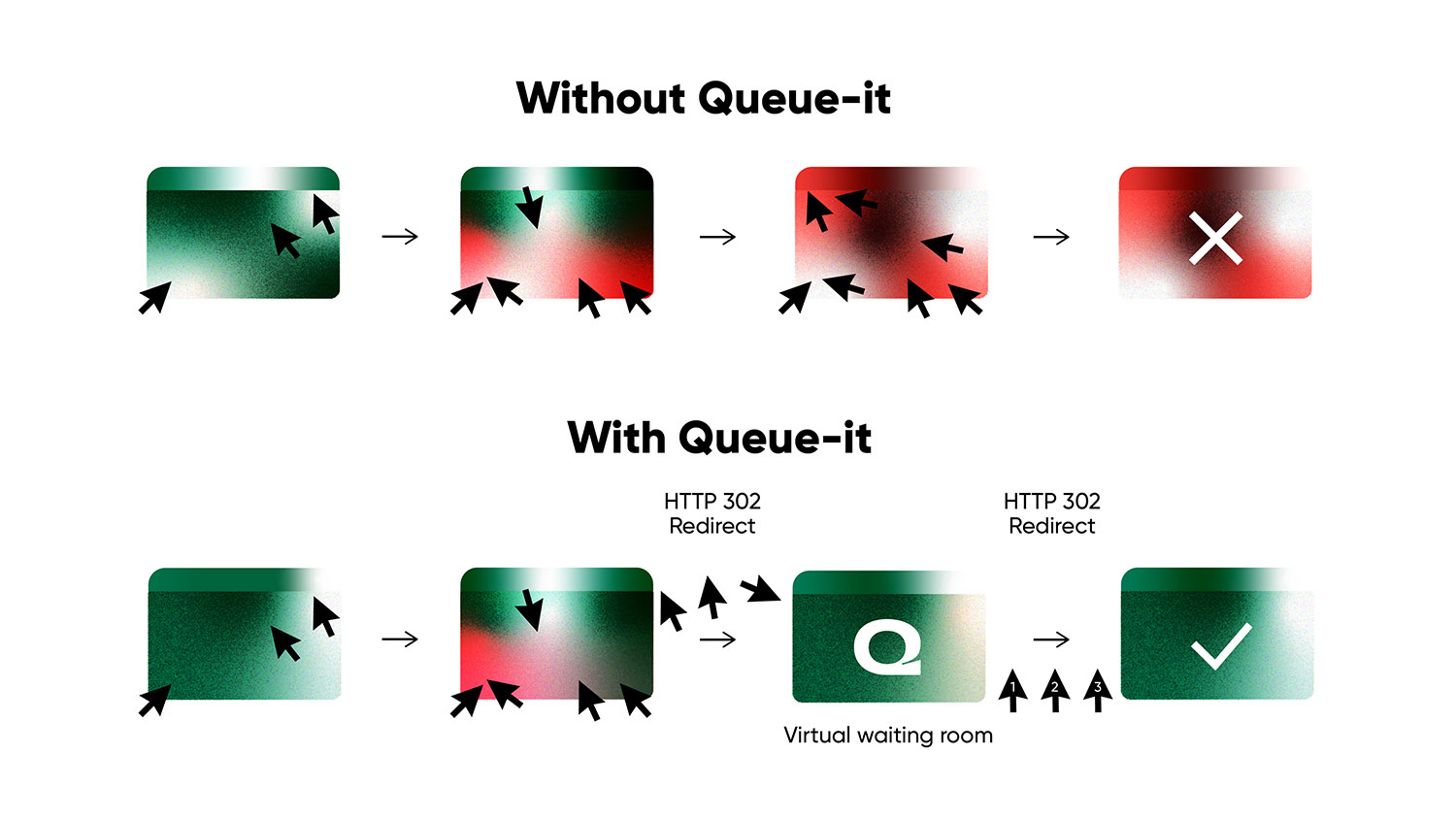
Ticket queuing systems aren’t just used to keep sites online, though. They’re also used by many ticketing companies to ensure fair and orderly site access, block bots and scalpers, and provide exclusive access to verified fans.
Online ticket queues work differently depending on which software solution a company uses and how they choose to set it up. Queue-it is the leading online queue software provider, running online ticket queues for over 500 ticketing companies, including Ticketmaster, AXS, and StubHub.
Ticket queuing systems run through Queue-it operate in one of three ways, depending on how a company sets it up:
- If the event is scheduled, the queue gives site access using a combination of randomization and first-in-first-out queuing
- If a traffic spike is unexpected and the queue activates automatically, it gives site access in first-in-first-out order
- If the event is exclusive, site access is granted only to verified visitors, typically using the same fairness mechanisms used for scheduled events
Whether the queue is random or not depends on which ticket queue management strategy the ticketing company chooses. So let’s look closer at these three approaches to show you how they work and how to know what kind of online queue you’re in.
The most common way ticketing companies use online queues is for scheduled events, such as a concert ticket sale, a sporting event, or a festival ticket sale. In this scenario, the company knows demand will be large, the event will sell out, and that bots and scalpers will try to snatch up tickets, so they activate the ticket queue before the sale to protect their site.
When companies use Queue-it for scheduled online ticket sales, all visitors who show up before a sale or registration goes live get directed to a pre-queue page with a countdown timer. If you see a countdown timer, it means the event hasn’t started yet and your spot in queue hasn’t been assigned. The pre-queue is like a digital holding area for early visitors.
When the timer hits zero, all visitors in the pre-queue get randomized, like a raffle, and flowed to the queue in their randomly assigned order.
Once the event has started and the randomization process is complete, all new arriving visitors get placed in the back of the queue for tickets in first-in-first-out order.
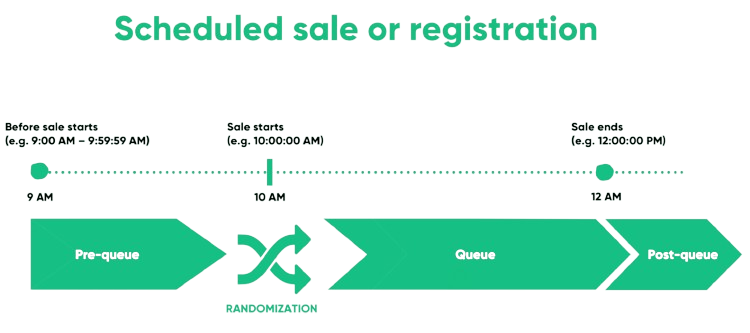
This approach of combining randomization and first-in-first-out queuing offers several key benefits, both for fans and for businesses:
- It ensures every visitor who shows up on time for the sale gets an equal chance at getting the first spot
- It removes the unfair speed advantages of online shopping bots and people with superfast internet
- It protects the site from early spikes in traffic, to keep it running smoothly
The user experience example below shows the different stages of this journey in Ticketmaster's ticket queue.
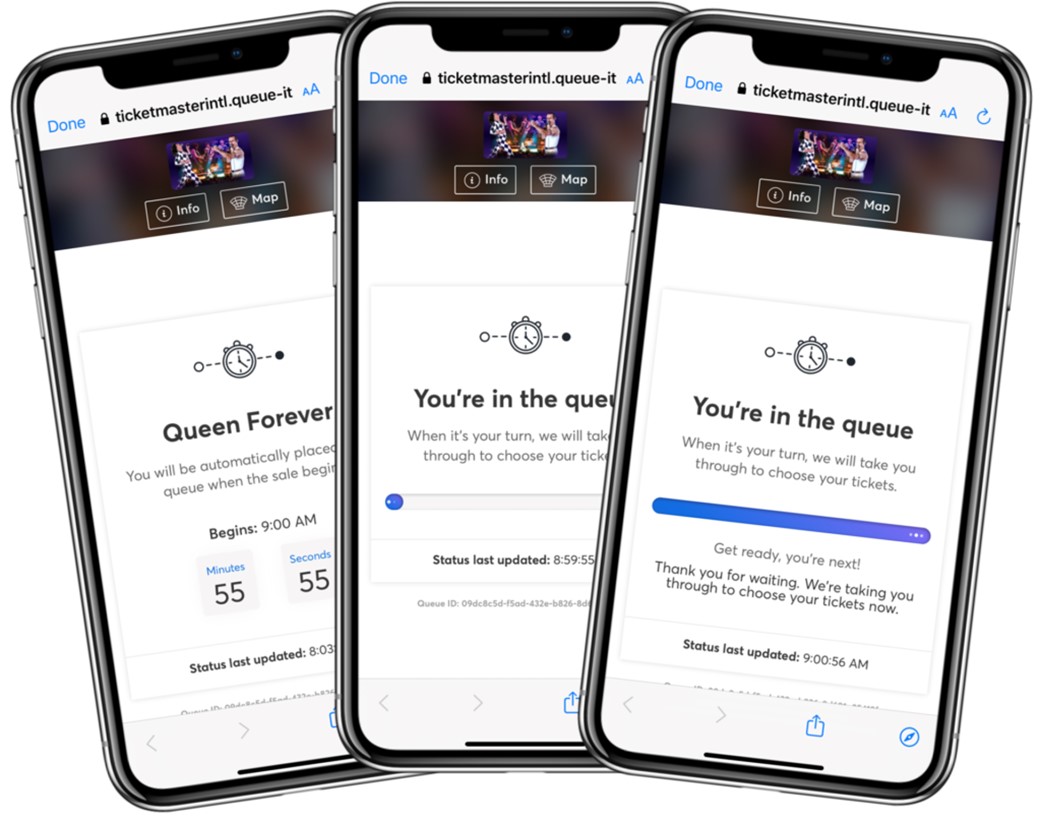
You can read more about why Queue-it and companies like Ticketmaster queue visitors in this way in our blog post Why First-in-first-out Queuing isn’t (always) the answer.
Brazilian ticketing company Ingresso uses the ticket queue in this way for one of the world's biggest music festivals, Rock in Rio.
Ingresso activates the waiting room pre-queue mode before the onsale goes live. From around 5:45 p.m., all early visitors are automatically redirected from Ingresso's site to the pre-queue countdown page.
When the sale goes live at 7 p.m., these visitors get randomized, and Ingresso starts flowing traffic from the waiting room to their site at the rate they choose.
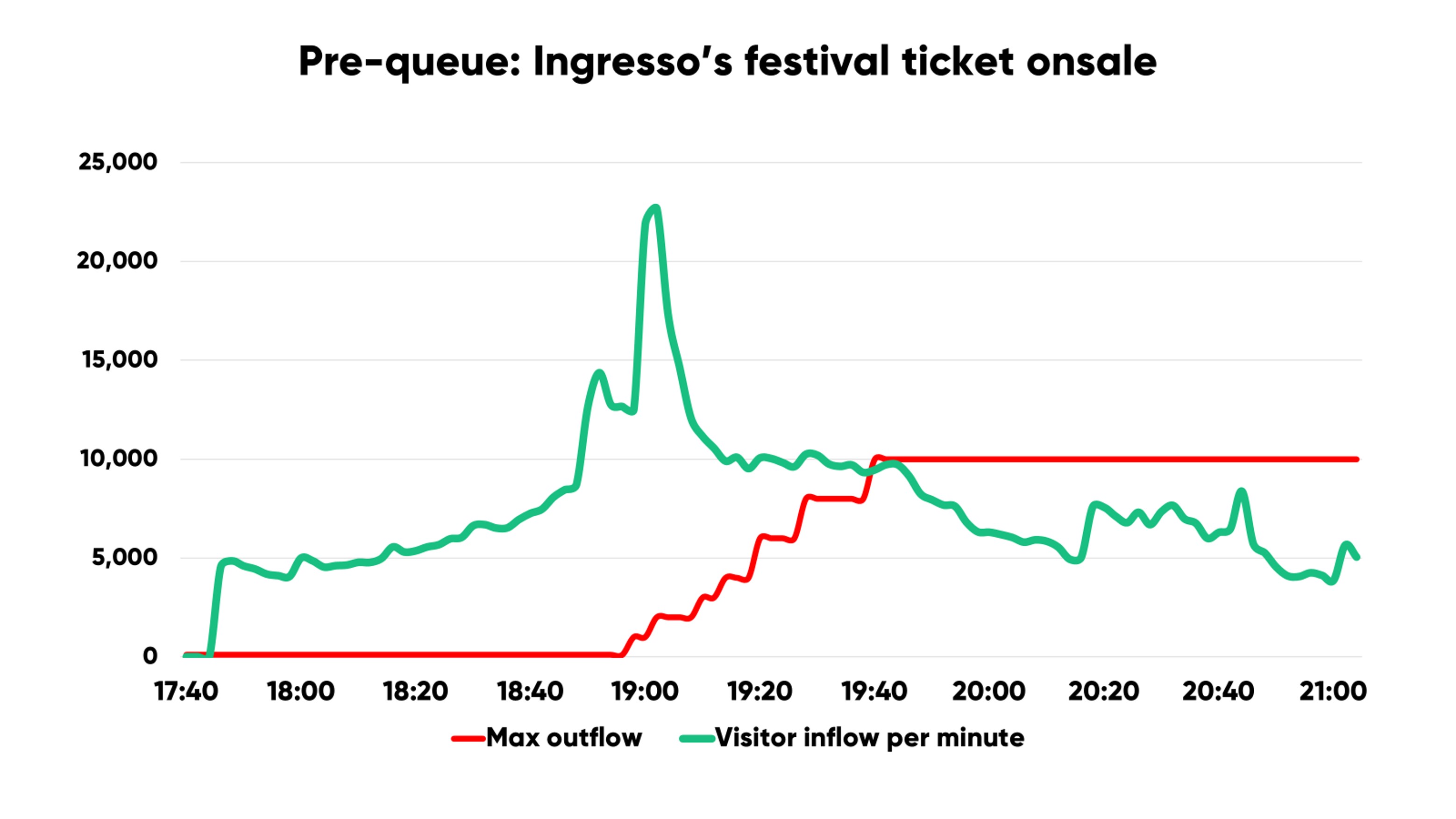
As the green line (visitor inflow) in the chart above shows, eager customers visited Ingresso's site long before the event actually went live, arriving in volumes of over 10,000 per minute.
The pre-queue protects the site from these early spikes and ensures fair access for the customers. But it also gives Ingresso complete control over the rate at which visitors are flowed to the site.
The red line (max outflow), shows how Ingresso slowly increased the outflow from waiting room to site throughout the onsale, ensuring they didn't encounter any issues as they scale up their infrastructure.
“Rather than having that line keep climbing and crashing down, Queue-it let us put it firmly in the middle, so we could sell smoothly and reliably. We’re able to sell much more tickets this way than when we’re dealing with huge spikes and falls.”
ROBERTO JOSE, HEAD OF TECHNOLOGY

Not all spikes in traffic can be predicted—sometimes news articles, viral social media posts, or marketing efforts from artists or promoters can drive unexpected surges in traffic to ticketing sites. That’s why many ticketing companies use Queue-it for 24/7 protection, with the queue only kicking in when traffic hits a set threshold.
When companies use online queues for 24/7 protection, the queue operates as a standard first-in, first-out (FIFO) queue. This means the first visitor who entered the queue is the first visitor to get access to the website, and the last visitor to enter the queue is the last one to get site access.
If you have a position in the queue (a queue number), you’re in a first-in-first-out queue. That means you’ll get access to the site before anyone who enters the queue after you do.
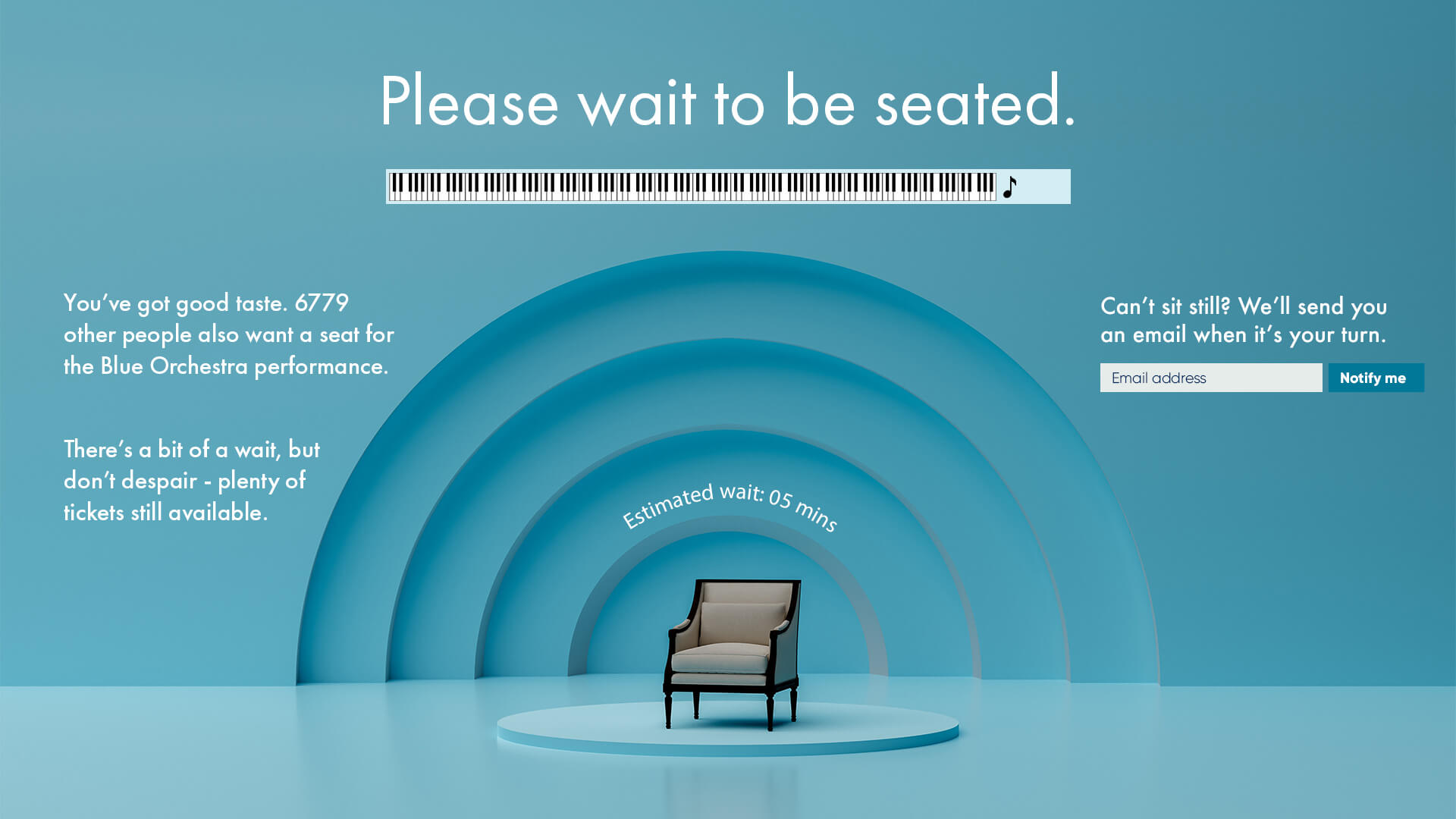
Online ticketing queues can also be used to give loyal fans presale or exclusive access. In this scenario, the queue typically operates in the same way as if you’re using it for a scheduled event. The key difference is that the only visitors who can enter the queue—and in turn access the target website or page—are the ones that are invited.
The exclusive access strategy is run using an invite-only waiting room. It lets companies incentivize loyalty program sign-ups and reward genuine fans while keeping out bots and resellers.
You can see user journey of an exclusive access online queue in the carousel below.
The invite-only waiting room is a particularly useful tool for keeping bots and bad actors out of sales and ensuring only verified fans get access.
In a recent high-profile concert ticket sale, for example, Queue-it worked with a leading company to block over 3.2 million bots and uninvited users.
Just 138,000 (4%) of the 3.3 million total requests to enter the onsale came from legitimate, trusted visitors.
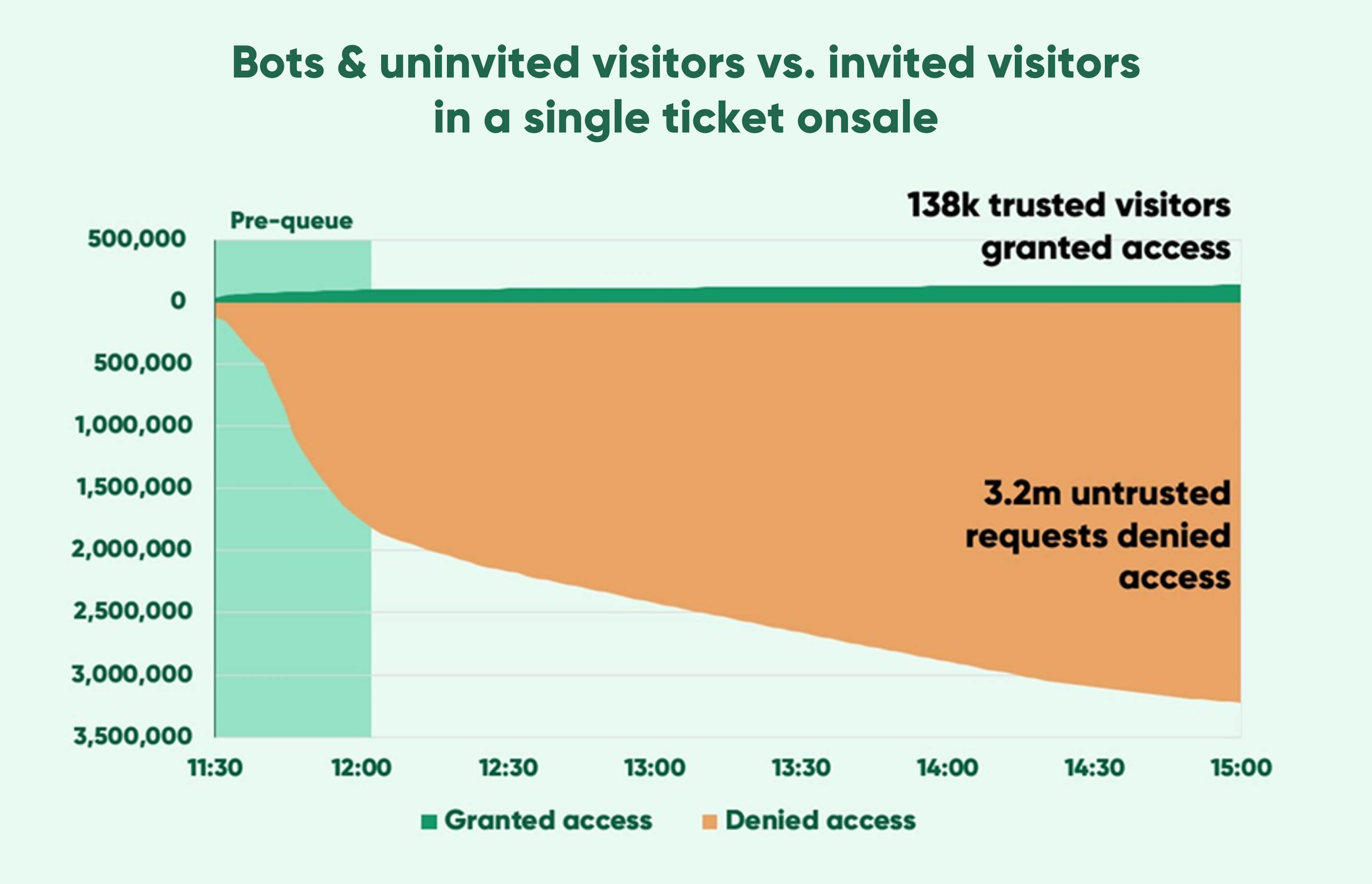
One scalper used bots to open their presale link for the event 31,325 times, but with Queue-it’s bot mitigation tools in place, got just one spot in queue.
Just like physical queues, companies use online queues when demand is high and there’s a need to fairly allocate goods or services.
This scenario is extremely common in ticketing, which is why over 500 ticketing companies across the globe use Queue-it. These include:
- Ticketmaster has blocked over 13 billion bots across 17,000 events with the help of Queue-it
- Megatix achieved 100% uptime across over 50 ticket sales, with a 40% reduction in support requests after implementing Queue-it
- Sympla reduced their scaling costs by 50% and successfully handled traffic spikes of up to 18,000 per minute using Queue-it
- Ingresso.com handled over a million visitors arriving in spikes of almost 25,000 per minute during their Rock in Rio festival ticket sale
- Ticketsolve uses Queue-it to handle high demand and deliver fairness for almost 300 distinct ticketing clients
- Peach Aviation, a Japanese airline, handled two million visitors to their airline ticket sale with the help of Queue-it
- A U.S.-based ticketing company blocked 8.3 million ticket bots and uninvited visitors across 50+ onsales with Queue-it’s invite-only waiting room
Peak traffic days are big opportunities for companies—for sales, for customer engagement and acquisition, and for brand reputation. But peak traffic also poses a threat. It can crash sites, it can produce errors, it can come with bots and scalpers that snatch tickets from genuine fans. These site problems:
- Harm sales: customers can’t check out on a website that doesn’t work.
- Damage hype: the hype they’ve worked so hard to build dies down while they work on getting things back up and running.
- Drain resources: IT teams work frantically to restore the site, while customer service and marketing teams work on crisis management.
- Tarnish reputation: fans turn to social media to complain and journalists quickly write hit pieces about a botched online ticket sale.
- Threaten relationships: the failure reflects poorly on artists, promoters, and other key stakeholders, who may question whether the company is the right one to work with.
In short, major ticketing companies use online ticket queue systems to avoid these problems by controlling site traffic, blocking bots and scalpers, and ensuring fair access to their sales.
But why do they need a website queue system to keep their sites online? Why don’t they just scale up or out?
They do scale. But at scale, everything breaks.
There is no “too big to fail” on the world wide web. Amazon, Walmart, Apple, the IRS—surging web traffic has taken all of them offline.
To prepare for a large spike in traffic, companies must optimize their systems in many ways, including scaling infrastructure.
But scaling alone is expensive at best, and risky at worst:
- Expensive: If you can’t predict how many people will show up, you must scale to handle the upper limits of your predictions to keep your site online. When these visitors show up in random patterns, you must keep your site scaled for peak load for the duration of an event. The costs of this add up fast.
- Complex: While scaling servers on the cloud may be relatively easy, getting each component of your tech stack to scale—either automatically or manually—is a difficult, expensive, and sometimes impossible task. You may have to go through the lengthy and pricey process of re-architecting systems and upgrading subscription levels with third-party vendors.
- Risky: Estimating traffic levels is difficult, making pre-scaling a risky strategy. Autoscaling also introduces risk, because of its delayed reaction time. Even if these approaches could handle sudden surges in traffic, bottlenecks almost always emerge at scale. This means traffic still overloads areas that are difficult or impossible to scale, such as databases, inventory management systems, or third-party services like payment gateways.
RELATED: 3 Autoscaling Challenges & How To Overcome Them With an Online Queue
Online queuing systems do what scaling cannot: they control the flow of online visitors.
Ticket queue systems complement scaling, allowing businesses to proactively protect their site against sudden spikes, safeguard key bottlenecks, and ensure scaling costs don’t get out of control. And as a bolt-on tool, the online queue system doesn’t require companies re-architect systems for peak traffic events that only occur a few times a year.
“Autoscaling doesn’t always react fast enough to ensure we stay online. Plus, it’s very expensive to autoscale every time there’s high traffic. If we did this for every traffic spike, it would cost more than double what we pay for Queue-it. So Queue-it was just the better approach, both in terms of reliability and cost.”
MIJAIL PAZ, HEAD OF TECHNOLOGY
In the ticketing business, preparedness is key to making the most of your brand’s biggest days. Whether it’s a concert, festival, sporting, or arts and cultural ticket sale, an online queue solution like Queue-it ensures you’re not only ready for the surge, but also positioned to capitalize on it. You get the confidence of knowing your site will stay online and your tickets will end up in the hands of genuine fans, not greedy scalpers.
Queue-it is the market-leading online ticketing queue system, having processed over 100 billion visitors from all across the globe. With a mission to power online trust, Queue-it empowers some of the world’s biggest businesses to capitalize on their biggest days. When Ticketmaster, AXS, and Stubhub need to control their online traffic, they turn to Queue-it.
Book a demo today and start preparing for your next high-profile online ticket sale.
